Module 4 Healthy food Unit 1 We’ve got lots of apples.课件45张
文档属性
| 名称 | Module 4 Healthy food Unit 1 We’ve got lots of apples.课件45张 | 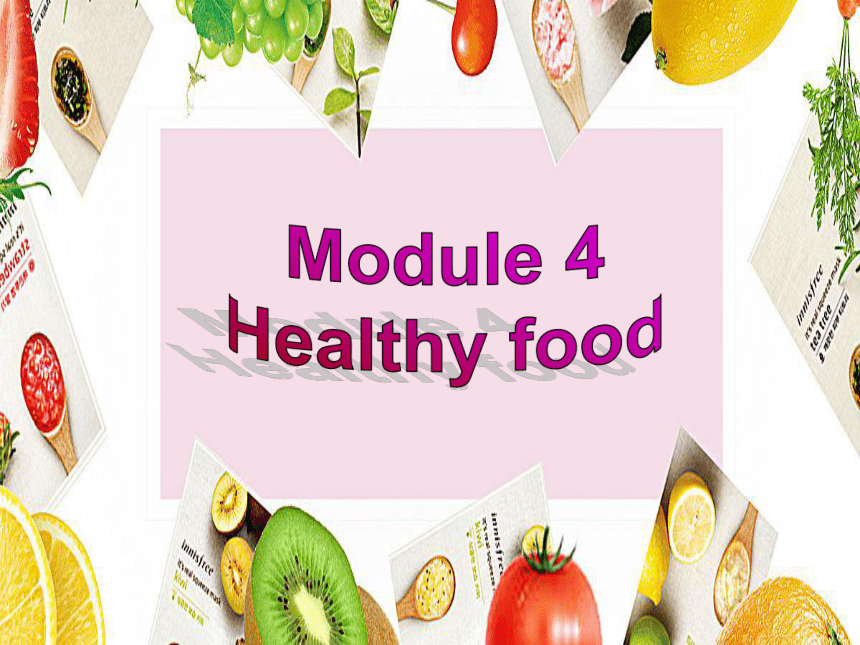 | |
| 格式 | zip | ||
| 文件大小 | 10.8MB | ||
| 资源类型 | 教案 | ||
| 版本资源 | 外研版 | ||
| 科目 | 英语 | ||
| 更新时间 | 2019-09-20 16:07:22 | ||
图片预览

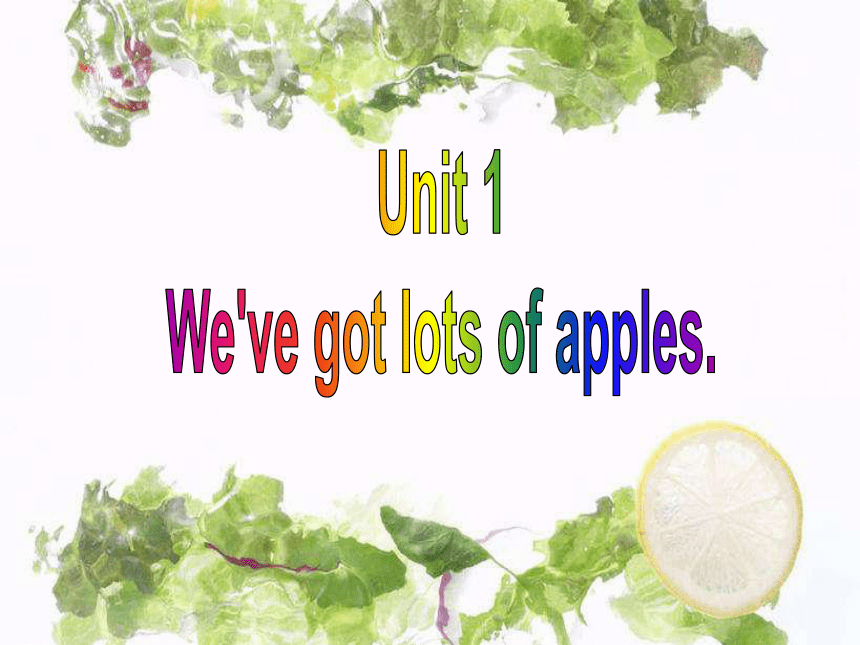
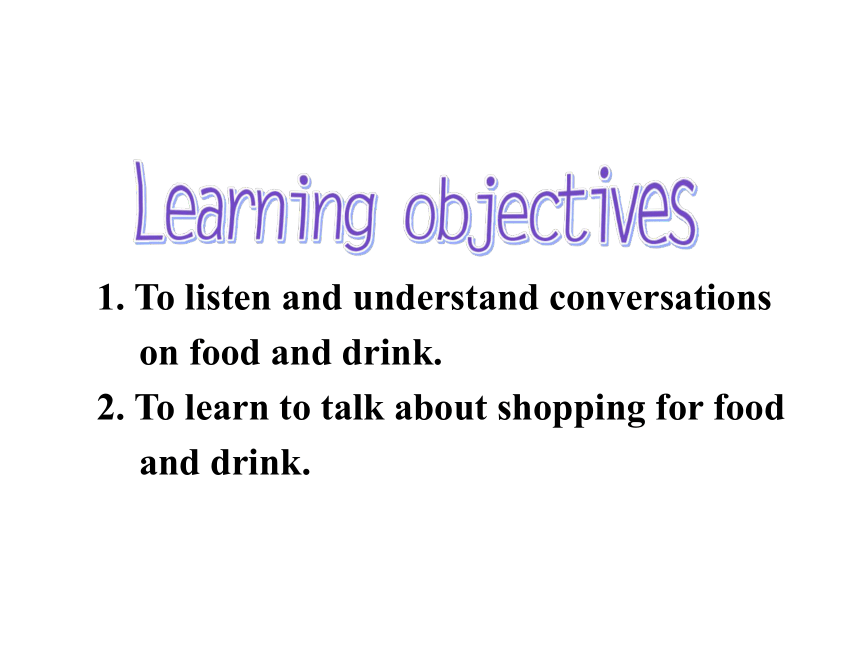
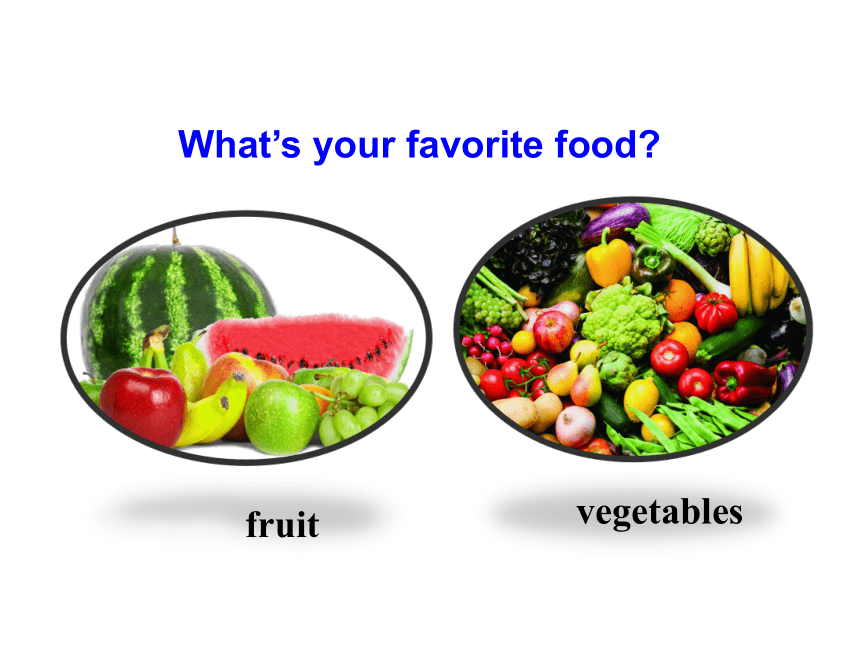
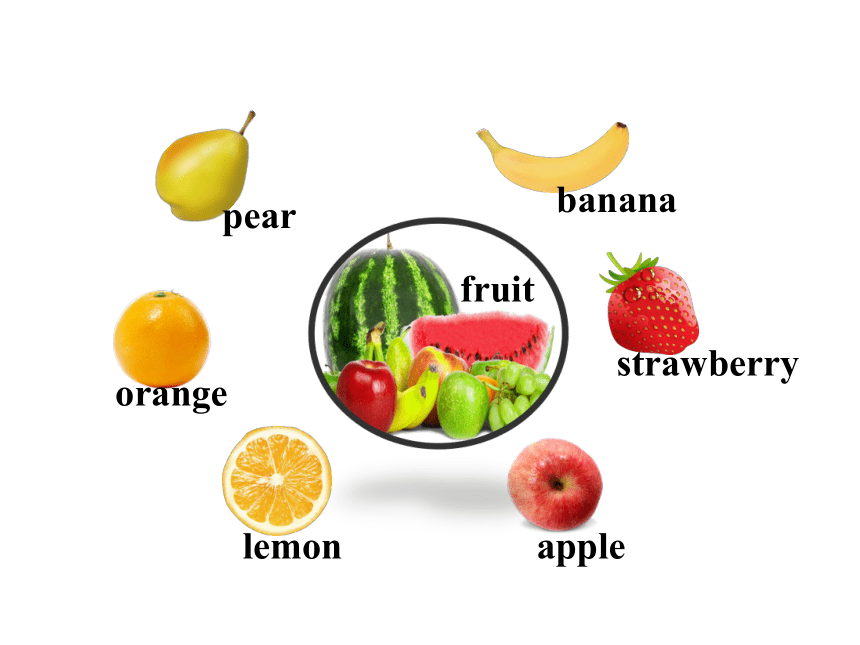
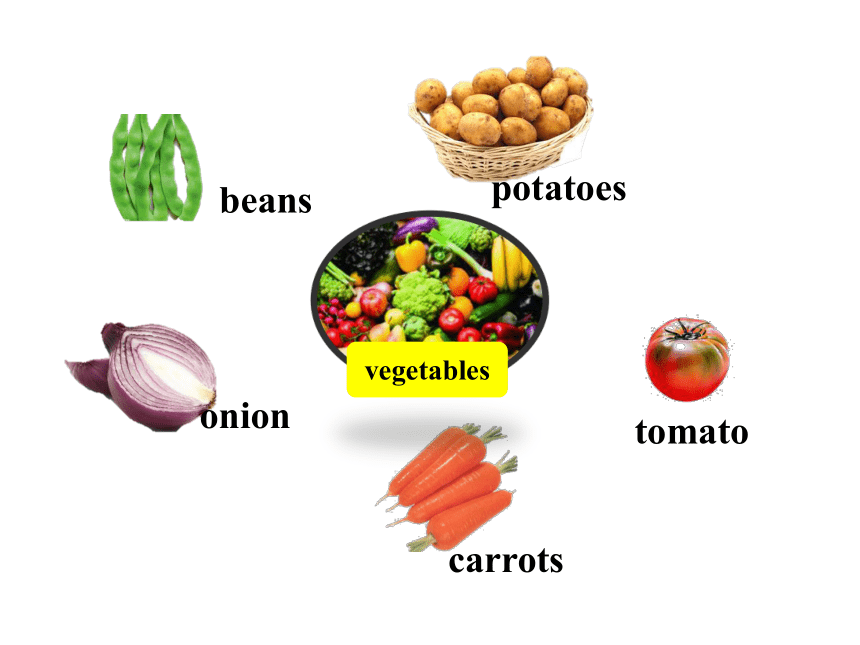
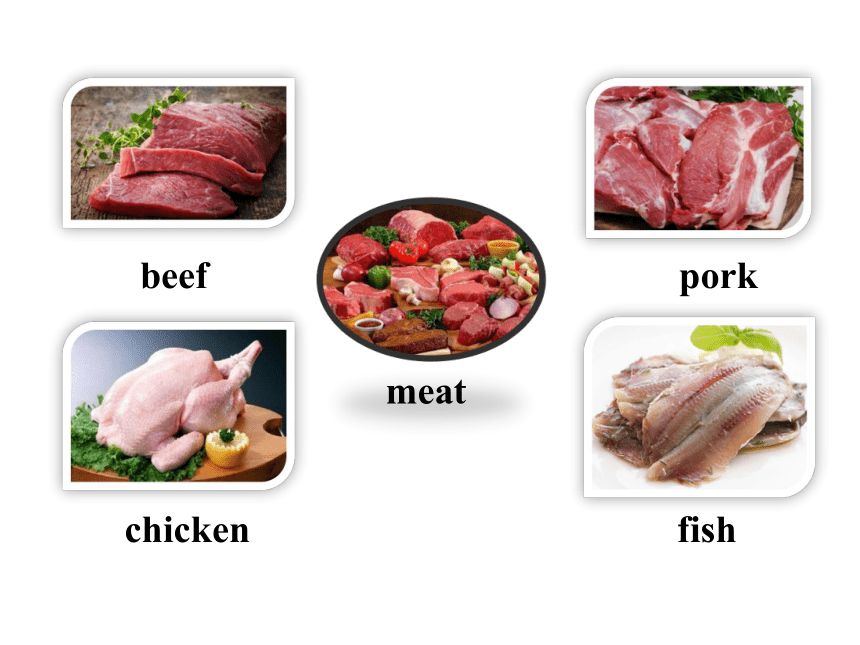

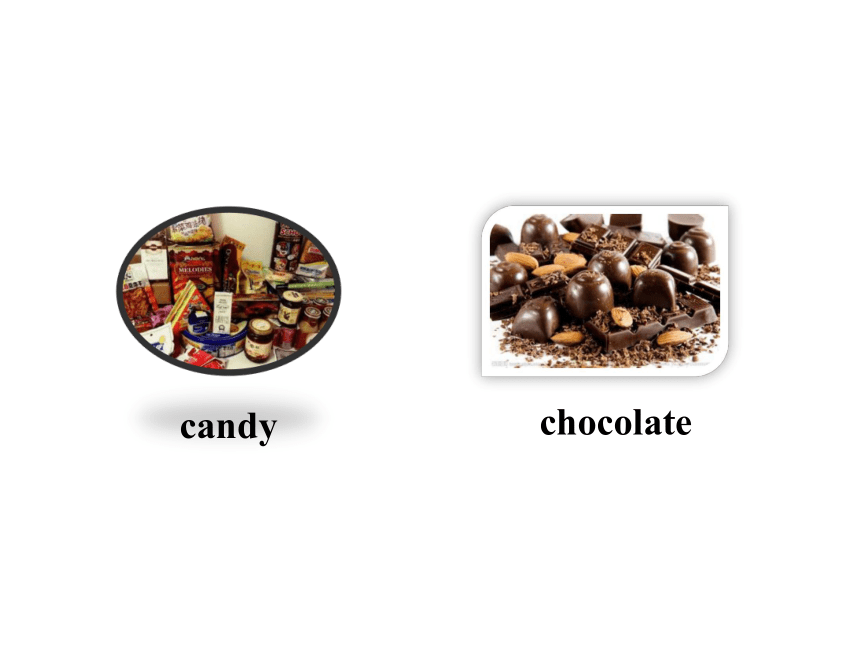
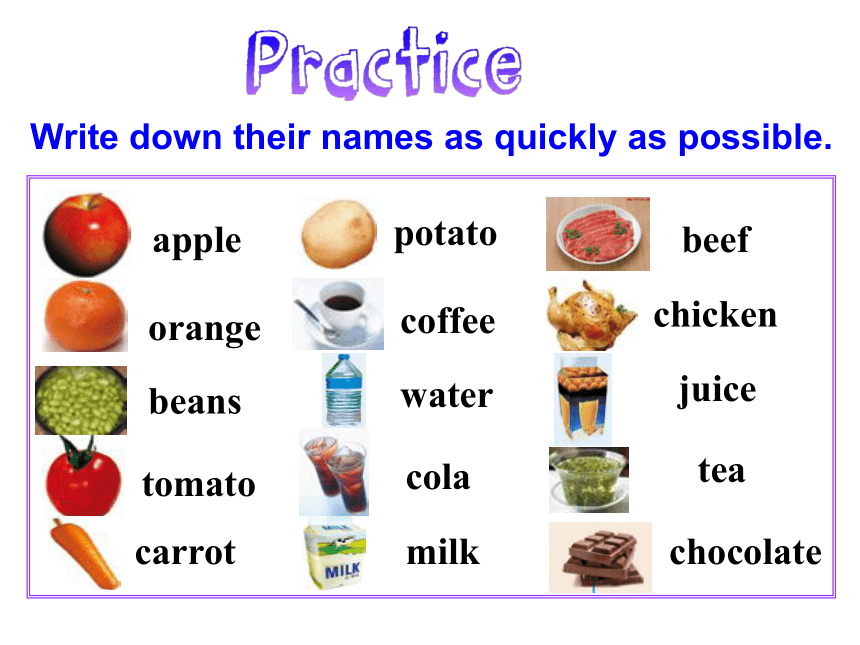
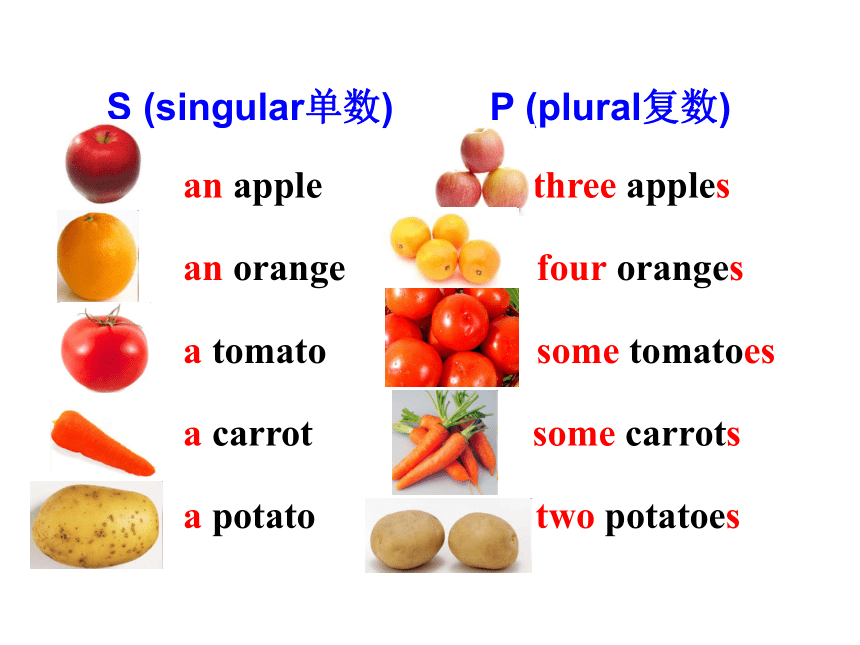
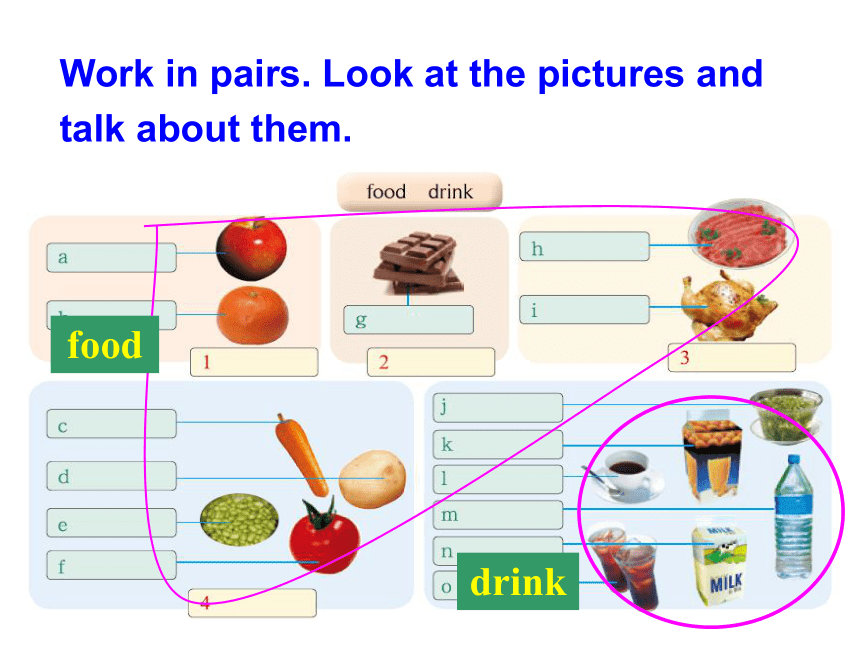
文档简介
(共45张PPT)
1. To listen and understand conversations on food and drink.
2. To learn to talk about shopping for food and drink.
What’s your favorite food?
fruit
vegetables
pear
banana
strawberry
orange
lemon
apple
fruit
beans
onion
carrots
potatoes
tomato
meat
beef
pork
chicken
fish
milk
juice
tea
water
cola
coffee
candy
chocolate
apple
orange
beans
tomato
carrot
coffee
water
cola
milk
beef
chicken
juice
tea
potato
chocolate
Write down their names as quickly as possible.
S (singular单数) P (plural复数)
an apple three apples
an orange four oranges
a tomato some tomatoes
a carrot some carrots
a potato two potatoes
Work in pairs. Look at the pictures and talk about them.
drink
food
Label the food in the pictures with the words from the box.
candy fruit meat vegetables
meat
candy
vegetables
fruit
Label the food and drink in the pictures with the words from the box.
apple beans beef carrot chicken
chocolate coffee cola juice milk
orange potato tea tomato water
apple
orange
chocolate
chicken
beef
tomato
potato
carrot
beans
water
tea
juice
coffee
cola
milk
FOOD
meat
fruit
beef
chicken
beans
carrot
potato
tomato
apple
orange
vegetables
Try to complete the table.
choco-late
DRINK
water
juice
milk
coffee
cola
tea
candy
apples juice
beans milk
beef oranges
carrots potatoes
chicken tea
coffee tomatoes
cola water
Listen and check (√) the food and drink Betty and her mother have got.
√
√
√
√
√
√
Listen again and help Betty make a shopping list.
drink
cola juice
milk water
vegetables
beans carrots
potatoes
meat
beef
Tapescript:
Betty’s mum: Betty, please help me make a
shopping list.
Betty: Yes, Mum.
Betty’s mum: What have we got?
Betty: We’ve got some chicken… apples and
oranges.
Betty’s mum: And we’ve got some tea,
tomatoes… and coffee.
Betty: But we haven’t got any cola… beans…
beef, carrots, juice and milk.
Betty’s mum: And we haven’t got any potatoes
and any water.
肯定句: 主语 + have/has got + …
“某人有某物”
I have got a lovely cat.
我有一只可爱的猫。
否定句: 主语 + haven’t/hasn’t got + …
“某人没有某物”
She hasn’t got a nice bike.
她没有一辆很棒的自行车。
Remember! Write words you learn in groups.
fruit: apple orange
meat: beef chicken fish
…
Listen and answer the questions.
1. Is too much chocolate good for our healthy?
No, it isn’t.
2. Have they got lots of apples?
Yes, they have.
3. Has Tony’s mum got any coffee?
No, she hasn’t.
Listen and complete the table.
orange juice,
coffee, cola, tea
meat, chicken, oranges
apples, chocolate
A: Have he got any…?
B: Yes, he has. He has got some…
No, he hasn’t. he hasn’t got any…
Things Tony’s family has got at home Things Tony’s family hasn’t got at home
Food
Drink
Let’s go shopping for ...
How about …
Good idea!
Talk about Tony’s shopping.
— Has he got any chicken?
— No, he hasn’t.
Pronunciation and speaking
bad food idea
apples potatoes vegetables
tea tomato water
drinks
Listen and repeat.
1. A tidy tiger tied a tie tighter to tidy her tiny tail.
2. Debbie did not destroy Darrell’s dishes.
Darrell destroyed Debbie’s dishes.
Listen and choose or .
apples
2. beans
3. drinks
4. potatoes
Make a shopping list.
Student A: Make a list of things you need.
Student B: Make a list of things you’ve got.
Now ask and answer.
— Have we got any …?
— Yes, we have. We’ve got some…
/ No, we haven’t.
We’ve got lots of apples. We haven’t got any oranges, so let’s get some.
have got表示所属关系,意为“某人有某物”。
1) 表示“某人有某物”时要用“主语+have / has got+其他”来表达,其中主语为第三人称单数时用has got, 其余一律用have got。 ?
e.g. They have got a big television.
他们有个大电视。
She __________ a computer.
她有台电脑。
has got
2) 含有have / has got的肯定句变为否定句时,在have或has后加not即可(主语+have / has not got +其他)。
have not 缩写haven’t
has not 缩写hasn’t
e.g. They haven’t got a big television.
他们没有大电视。
She hasn’t got a computer.
她没有电脑。
3) 含有have / has got的肯定句变为一般
疑问句时,只须将have或has提前到句
首(Have / Has+主语+got+其他?);
其肯定回答为:
Yes, 主语(人称代词)+have / has.
否定回答为:
No, 主语(人称代词)+haven’t / hasn’t.
e.g. _______ they got a big television?
_____________ / No, they _______.
他们有大电视吗?是的,他们有。/
不,他们没有。
______ she got a computer?
Yes, she has. / ____________.
她有电脑吗?
是的,她有。/ 不,她没有。
Has
No, she hasn’t
Have
Yes, they have.
haven’t
there be与have got
there be表示某个地方有某物或某人,表示的是“存在”,而have got表示的是“所有”。
e.g. I have got a new book.
我有一本新书。
There is a new book on the desk.
桌子上放着一本新书。
have got和there be有时表达的意思有些相近,但句型和侧重点还是有不同。
e.g. We haven’t got any meat in the fridge.
我们冰箱里没肉了。
There isn’t any meat in the fridge.
冰箱里没有肉了。
两句都表示冰箱里没有肉,但是第一句强调“我们没有肉了”,冰箱是次要的;而第二句则强调“冰箱里没有肉了”,至于其他地方,就无从知晓了。
【运用】Ⅰ. 根据汉语意思完成英语句子。
1) 我有一部电话。
I ___________ a telephone.??
2) 他们有三个书包。
They ____________ three bags.??
3) 他的书包里没有食物。
He ____________ any food in his bag.
4) 她有两个苹果。
She ____________ two apples.
have got???
have got???
hasn't got??
has got
Ⅱ. 根据括号内的要求完成下列各题。
1) I have got a cat.? (改为一般疑问句并作肯定回答)
— _______________ a cat?
— _____, __________.
2) They have got some footballs. ?(改为一般疑问句并作否定回答)
— _______________ any footballs??
— _____, _____________.
Have you got
Yes I have???
Have they got
No they haven't
3) He has got a computer. ?(改为一般疑问句并作肯定回答)
— _______________ a computer?
— _____, __________.
4) She has got a brother. (改为一般疑问句并作否定回答)
— ______________ a brother??
— ____, ___________.
Have you got
Yes he has?????
Has she got
No she hasn't
1. have/has got 拥有
2. go shopping 去买东西;去购物
3. let’s do sth. 让我们去做某事
4. too much 太多
5. too many 太多
6. lots of 许多
7. be good for 对……有益
8. be bad for 对……有害
9. How about…? ……好吗?……行吗?
Ⅰ.根据语境及所给汉语提示语写出所缺单词。
1. The ________(糖果) shop is next to the
library.
2. There are many ________(豆) on the chair.??
3. Jenny likes ________(水果) and vegetables.?
4. Can you see those ________(西红柿) there?
5. Let’s get some ________(牛肉) in the
afternoon.
candy
beans
fruit?
tomatoes
beef
Ⅱ.根据汉语意思完成英语句子,每空一词。
1. Jane有一只黑色的猫。
Jane ________ ________ a black cat.
2. 咱们去购物吧。
Let’s ________ ________.
3. 不要喝太多可乐。
Don’t drink ________ ________ cola.
has got
go shopping
too much
4. 我非常喜欢橘子汁。
I like ________ ________ very much.
5. 这本书里面有很多号码。
There are ________ ________ numbers in
the book.
orange juice
lots of
You are going to go shopping with your mother. Make a list of things you need and things you’ve got.
1. To listen and understand conversations on food and drink.
2. To learn to talk about shopping for food and drink.
What’s your favorite food?
fruit
vegetables
pear
banana
strawberry
orange
lemon
apple
fruit
beans
onion
carrots
potatoes
tomato
meat
beef
pork
chicken
fish
milk
juice
tea
water
cola
coffee
candy
chocolate
apple
orange
beans
tomato
carrot
coffee
water
cola
milk
beef
chicken
juice
tea
potato
chocolate
Write down their names as quickly as possible.
S (singular单数) P (plural复数)
an apple three apples
an orange four oranges
a tomato some tomatoes
a carrot some carrots
a potato two potatoes
Work in pairs. Look at the pictures and talk about them.
drink
food
Label the food in the pictures with the words from the box.
candy fruit meat vegetables
meat
candy
vegetables
fruit
Label the food and drink in the pictures with the words from the box.
apple beans beef carrot chicken
chocolate coffee cola juice milk
orange potato tea tomato water
apple
orange
chocolate
chicken
beef
tomato
potato
carrot
beans
water
tea
juice
coffee
cola
milk
FOOD
meat
fruit
beef
chicken
beans
carrot
potato
tomato
apple
orange
vegetables
Try to complete the table.
choco-late
DRINK
water
juice
milk
coffee
cola
tea
candy
apples juice
beans milk
beef oranges
carrots potatoes
chicken tea
coffee tomatoes
cola water
Listen and check (√) the food and drink Betty and her mother have got.
√
√
√
√
√
√
Listen again and help Betty make a shopping list.
drink
cola juice
milk water
vegetables
beans carrots
potatoes
meat
beef
Tapescript:
Betty’s mum: Betty, please help me make a
shopping list.
Betty: Yes, Mum.
Betty’s mum: What have we got?
Betty: We’ve got some chicken… apples and
oranges.
Betty’s mum: And we’ve got some tea,
tomatoes… and coffee.
Betty: But we haven’t got any cola… beans…
beef, carrots, juice and milk.
Betty’s mum: And we haven’t got any potatoes
and any water.
肯定句: 主语 + have/has got + …
“某人有某物”
I have got a lovely cat.
我有一只可爱的猫。
否定句: 主语 + haven’t/hasn’t got + …
“某人没有某物”
She hasn’t got a nice bike.
她没有一辆很棒的自行车。
Remember! Write words you learn in groups.
fruit: apple orange
meat: beef chicken fish
…
Listen and answer the questions.
1. Is too much chocolate good for our healthy?
No, it isn’t.
2. Have they got lots of apples?
Yes, they have.
3. Has Tony’s mum got any coffee?
No, she hasn’t.
Listen and complete the table.
orange juice,
coffee, cola, tea
meat, chicken, oranges
apples, chocolate
A: Have he got any…?
B: Yes, he has. He has got some…
No, he hasn’t. he hasn’t got any…
Things Tony’s family has got at home Things Tony’s family hasn’t got at home
Food
Drink
Let’s go shopping for ...
How about …
Good idea!
Talk about Tony’s shopping.
— Has he got any chicken?
— No, he hasn’t.
Pronunciation and speaking
bad food idea
apples potatoes vegetables
tea tomato water
drinks
Listen and repeat.
1. A tidy tiger tied a tie tighter to tidy her tiny tail.
2. Debbie did not destroy Darrell’s dishes.
Darrell destroyed Debbie’s dishes.
Listen and choose or .
apples
2. beans
3. drinks
4. potatoes
Make a shopping list.
Student A: Make a list of things you need.
Student B: Make a list of things you’ve got.
Now ask and answer.
— Have we got any …?
— Yes, we have. We’ve got some…
/ No, we haven’t.
We’ve got lots of apples. We haven’t got any oranges, so let’s get some.
have got表示所属关系,意为“某人有某物”。
1) 表示“某人有某物”时要用“主语+have / has got+其他”来表达,其中主语为第三人称单数时用has got, 其余一律用have got。 ?
e.g. They have got a big television.
他们有个大电视。
She __________ a computer.
她有台电脑。
has got
2) 含有have / has got的肯定句变为否定句时,在have或has后加not即可(主语+have / has not got +其他)。
have not 缩写haven’t
has not 缩写hasn’t
e.g. They haven’t got a big television.
他们没有大电视。
She hasn’t got a computer.
她没有电脑。
3) 含有have / has got的肯定句变为一般
疑问句时,只须将have或has提前到句
首(Have / Has+主语+got+其他?);
其肯定回答为:
Yes, 主语(人称代词)+have / has.
否定回答为:
No, 主语(人称代词)+haven’t / hasn’t.
e.g. _______ they got a big television?
_____________ / No, they _______.
他们有大电视吗?是的,他们有。/
不,他们没有。
______ she got a computer?
Yes, she has. / ____________.
她有电脑吗?
是的,她有。/ 不,她没有。
Has
No, she hasn’t
Have
Yes, they have.
haven’t
there be与have got
there be表示某个地方有某物或某人,表示的是“存在”,而have got表示的是“所有”。
e.g. I have got a new book.
我有一本新书。
There is a new book on the desk.
桌子上放着一本新书。
have got和there be有时表达的意思有些相近,但句型和侧重点还是有不同。
e.g. We haven’t got any meat in the fridge.
我们冰箱里没肉了。
There isn’t any meat in the fridge.
冰箱里没有肉了。
两句都表示冰箱里没有肉,但是第一句强调“我们没有肉了”,冰箱是次要的;而第二句则强调“冰箱里没有肉了”,至于其他地方,就无从知晓了。
【运用】Ⅰ. 根据汉语意思完成英语句子。
1) 我有一部电话。
I ___________ a telephone.??
2) 他们有三个书包。
They ____________ three bags.??
3) 他的书包里没有食物。
He ____________ any food in his bag.
4) 她有两个苹果。
She ____________ two apples.
have got???
have got???
hasn't got??
has got
Ⅱ. 根据括号内的要求完成下列各题。
1) I have got a cat.? (改为一般疑问句并作肯定回答)
— _______________ a cat?
— _____, __________.
2) They have got some footballs. ?(改为一般疑问句并作否定回答)
— _______________ any footballs??
— _____, _____________.
Have you got
Yes I have???
Have they got
No they haven't
3) He has got a computer. ?(改为一般疑问句并作肯定回答)
— _______________ a computer?
— _____, __________.
4) She has got a brother. (改为一般疑问句并作否定回答)
— ______________ a brother??
— ____, ___________.
Have you got
Yes he has?????
Has she got
No she hasn't
1. have/has got 拥有
2. go shopping 去买东西;去购物
3. let’s do sth. 让我们去做某事
4. too much 太多
5. too many 太多
6. lots of 许多
7. be good for 对……有益
8. be bad for 对……有害
9. How about…? ……好吗?……行吗?
Ⅰ.根据语境及所给汉语提示语写出所缺单词。
1. The ________(糖果) shop is next to the
library.
2. There are many ________(豆) on the chair.??
3. Jenny likes ________(水果) and vegetables.?
4. Can you see those ________(西红柿) there?
5. Let’s get some ________(牛肉) in the
afternoon.
candy
beans
fruit?
tomatoes
beef
Ⅱ.根据汉语意思完成英语句子,每空一词。
1. Jane有一只黑色的猫。
Jane ________ ________ a black cat.
2. 咱们去购物吧。
Let’s ________ ________.
3. 不要喝太多可乐。
Don’t drink ________ ________ cola.
has got
go shopping
too much
4. 我非常喜欢橘子汁。
I like ________ ________ very much.
5. 这本书里面有很多号码。
There are ________ ________ numbers in
the book.
orange juice
lots of
You are going to go shopping with your mother. Make a list of things you need and things you’ve got.
同课章节目录
- Starte
- Module 1 My teacher and my friends
- Module 2 My English lesson
- Module 3 My English book
- Module 4 My everyday life
- Module 1 My classmates
- Unit 1 Nice to meet you.
- Unit 2 I'm Wang Lingling and I'm thirteen years ol
- Unit 3 Language in use.
- Module 2 My family
- Unit 1 Is this your mum?
- Unit 2 These are my parents.
- Unit 3 Language in use.
- Module 3 My school
- Unit 1 There are thirty students in my class.
- Unit 2 The library is on the left of the playgroun
- Unit 3 Language in use.
- Module 4 Healthy food
- Unit 1 We've got lots of apples.
- Unit 2 Is your food and drink healthy?
- Unit 3 Language in use.
- Module 5 My school day
- Unit 1 I love history.
- Unit 2 We start work at nine o'clock.
- Unit 3 Language in use.
- Revision module A
- Module 6 A trip to the zoo
- Unit 1 Does it eat meat?
- Unit 2 The tiger lives in Asia.
- Unit 3 Language in use.
- Module 7 Computers
- Unit 1 How do I write my homework on the computer?
- Unit 2 When do you use a computer?
- Unit 3 Language in use.
- Module 8 Choosing presents
- Unit 1 I always like birthday parties.
- Unit 2 She often goes to concerts.
- Unit 3 Language in use.
- Module 9 People and places
- Unit 1 We're enjoying the school trip a lot.
- Unit 2 They're waiting for buses or trains.
- Unit 3 Language in use.
- Module 10 Spring Festival
- Unit 1 Are you getting ready for Spring Festival?
- Unit 2 My mother's cleaning our houses and sweepin
- Unit 3 Language in use.
- Revision module B
